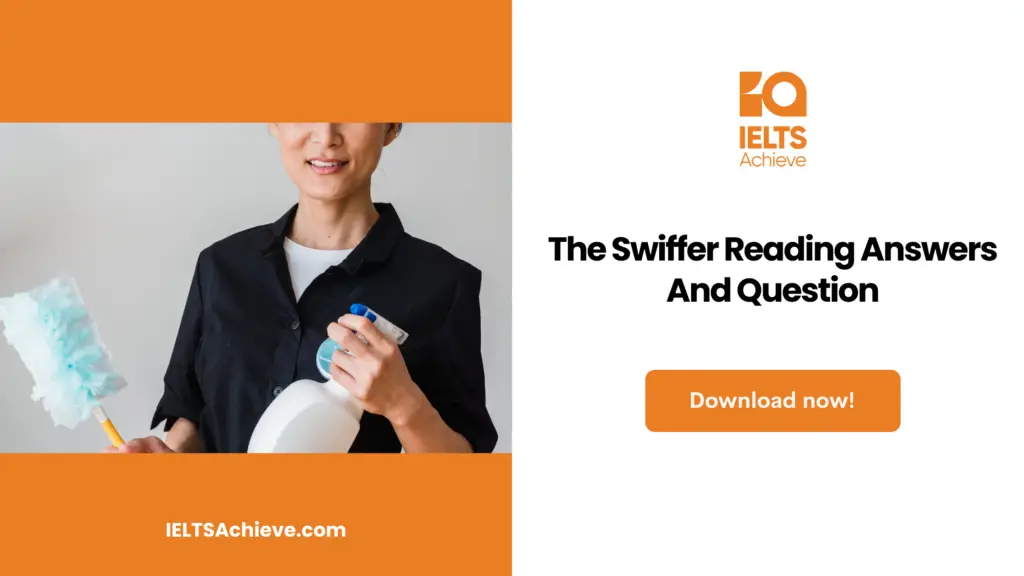The Blog post contains the following IELTS Reading Questions:
- IELTS Reading Summary Completion
- IELTS Reading True/False/Not Given
- IELTS Reading Multiple Choice Questions
Stay informed and prepared for success – Explore our comprehensive Reading Test Info page to get valuable insights, exam format details, and expert tips for mastering the IELTS Reading section.
IELTS Reading passage – Designed to Last

Designed to Last
Jonathan Chapman, a senior lecturer at the University of Brighton, UK, is one of a new breed of ‘sustainable designers’. Like many of us, they are concerned about the huge waste associated with Western consumer culture and the damage this does to the environment. Some, like Chapman, aim to create objects we will want to keep rather than discard. Others are working to create more efficient or durable consumer goods, or goods designed with recycling in mind. The waste entailed in our fleeting relationships with consumer durables is colossal.
Domestic power tools, such as electric drills, are a typical example of such waste. However much DIY the purchaser plans to do, the truth is that these things are thrown away having been used, on average, for just ten minutes. Most will serve ‘conscience time’, gathering dust on a shelf in the garage; people are reluctant to admit that they have wasted their money. However, the end is inevitable: thousands of years in land-fill waste sites. In its design, manufacture, packaging, transportation and disposal, a power tool consumes many times its own weight of resources, all for a shorter active lifespan than that of the average small insect.
To understand why we have become so wasteful, we should look to the underlying motivation of consumers. “People own things to give expression to who they are, and to show what group of people they feel they belong to,” Chapman says. In a world of mass production, however, that symbolism has lost much of its potency. For most of human history, people had an intimate relationship with objects they used or treasured. Often they made the objects themselves, or family members passed them on. For more specialised objects, people relied on expert manufacturers living close by, whom they probably knew personally. Chapman points out that all these factors gave objects a history — a narrative — and an emotional connection that today’s mass-produced goods cannot possibly match. Without these personal connections, consumerist culture idolizes novelty instead. People know that they cannot buy happiness, but the chance to remake themselves with glossy, box-fresh products seems irresistible. When the novelty fades, they simply renew the excitement by buying more.
Chapman’s solution is what he calls ’emotionally durable design’. He says the challenge for designers is to create things we want to keep. This may sound like a tall order but it can be surprisingly straightforward. A favorite pair of old jeans, for example, just do not have the right feel until they have been worn and washed a hundred times. It is as if they are sharing the wearer’s life story. The look can be faked, but it is simply not the same. Walter Stahel, visiting professor at the University of Surrey, UK, calls this ‘the teddy bear factor’. No matter how ragged and worn a favorite teddy becomes, we don’t rush out and buy another one. As adults, our teddy bear connects us to our childhood and this protects it from obsolescence. Stahel argues that this is what sustainable design needs to do with more products.
The information age was supposed to lighten our economies and reduce our impact on the environment, but, in fact, the reverse seems to be happening. We have simply added information technology to the industrial era and speeded up the developed world’s metabolism. The cure is hardly rocket science: minimise waste, stop moving things around so much and use people more. So what will post-throwaway consumerism look like? It might be as simple as installing energy-saving light bulbs, more efficient washing machines or choosing locally produced groceries with less packaging. In general, we will spend less on goods and more on services. Instead of buying a second car, for example, we might buy into a car-sharing network. Rather than following our current wasteful practices, we will buy less and rent a lot more; why own things such as tools that you use infrequently, especially things are likely to be updated all the time?
Consumer durables will increasingly be sold with plans for their disposal. Electronic goods such as mobile phones will be designed to be recyclable, with the extra cost added into the retail price. Following Chapman’s notion of emotionally durable design, there will be a move away from mass production and towards tailor-made articles and products designed and manufactured with greater craftsmanship, products which will be repaired rather than replaced, in the same way as was done in our grandparents’ time. Companies will replace profit from bulk sales by servicing and repairing products chosen because we want them to last.
Chapman acknowledges that it will be a challenge to persuade people to buy fewer goods, and ones that they intend to keep. At the moment, price competition between retailers makes it cheaper for consumers to replace rather than repair.
Products designed to be durable and emotionally satisfying are likely to be more expensive, so how will we be persuaded to choose sustainability? Tim Cooper, from Sheffield Hallam University in the UK, points out that many people are already happy to pay a premium for quality, and that they also tend to value and care more for expensive goods. Chapman is also positive: “People are ready to keep things for longer,” he says, “The problem is that a lot of industries don’t know how to do that.” Chapman believes that sustainable design is here to stay. “The days when large corporations were in a position to choose whether to jump on the sustainability band-wagon or not are coming to an end,” he says. Whether this is also the beginning of the end of the throwaway society remains to be seen.
Unlock your full potential in the IELTS Reading section – Visit our IELTS Reading Practice Question Answer page now!
Recommended Questions:
Renewable Energy IELTS Reading Question with Answer
Questions 27-31
Choose the correct letter, A, B, C or D. Write the correct letter in boxes 27-31 on your answer sheet.
27. In the second paragraph, the expression ‘conscience time’ refers to the fact that the owners
A. wish they had not bought the power tool.
B. want to make sure the tool is stored safely.
C. feel that the tool will increase in value in the future.
D. would feel guilty if they threw the tool away immediately.
28. Jonathan Chapman uses the word ‘narrative’ in the third paragraph to refer to the fact that the owner
A. told a story about how the item was bought.
B. was aware of how the item had come into being.
C. felt that the item became more useful over time.
D. was told that the item had been used for a long time.
29. In the third paragraph, the writer suggests that mass-produced goods are
A. inferior in quality.
B. less likely to be kept for a long time.
C. attractive because of their lower prices.
D. less tempting than goods which are traditionally produced.
30. Lack of personal connection to goods is described as producing
A. a belief that older goods are superior.
B. an attraction to well-designed packaging.
C. a desire to demonstrate status through belongings.
D. a desire to purchase a constant stream of new items.
31. Jeans and teddy bears are given as examples of goods which
A. have been very well designed.
B. take a long time to show wear.
C. are valued more as they grow older.
D. are used by the majority of the population.
Ready to improve your performance in Multiple Choice Questions (MCQs)? Click here to access our comprehensive guide on how to tackle MCQs effectively in the IELTS Reading section.
Questions 32-35
Do the following statements agree with the views of the writer in reading Passage 3? In boxes 32-35 on your answer sheet, write
TRUE if the statement agrees with the views of the writer
FALSE if the statement contradicts the views of the writer
NOT GIVEN if it is impossible to say what the writer thinks about this
32. People often buy goods that they make little use of.
33. Understanding the reasons for buying goods will help to explain why waste occurs.
34. People already rent more goods than they buy.
35. Companies will charge less to repair goods in the future.
Enhance your skills in identifying information as True, False, or Not Given. Click here to discover expert strategies and techniques for mastering this question type in the IELTS Reading section.
Questions 36-40
Complete the summary using the list of words, A-I, below Write the correct letter, A-I, in boxes 36-40 on your answer sheet.
A cure for our wasteful habits
The writer believes that the recipe for reducing our impact on the environment is a simple one. He states that we should use less energy for things such as lighting or (36)…………….., and buy (37)…………….. that will not need to be moved across long distances.
Some expensive items such as (38)…………..could be shared, and others which may be less expensive but which are not needed often, such as (39)……………., could be rented instead of being purchased. He believes that manufacturers will need to design high-technology items such as (40)…………..so that they can be recycled more easily.
A mobile phones
B clothing
C tools
D laundry
E computers
F food
G heating
H cars
I teddy bears
Boost your performance in Summary, Notes, Table, and Flowchart Completion tasks. Click here to explore our detailed guide and learn how to effectively complete summaries, notes, tables, and flowcharts in the IELTS Reading section.
Unlock your full potential in the IELTS Reading section – Visit our IELTS Reading Practice Question Answer page now!
Recommended Questions:
Renewable Energy IELTS Reading Question with Answer

We hope you found this post useful in helping you to study for the IELTS Test. If you have any questions please let us know in the comments below or on the Facebook page.
The best way to keep up to date with posts like this is to like us on Facebook, then follow us on Instagram and Pinterest. If you need help preparing for the IELTS Test, join the IELTS Achieve Academy and see how we can assist you to achieve your desired band score. We offer an essay correction service, mock exams and online courses.


